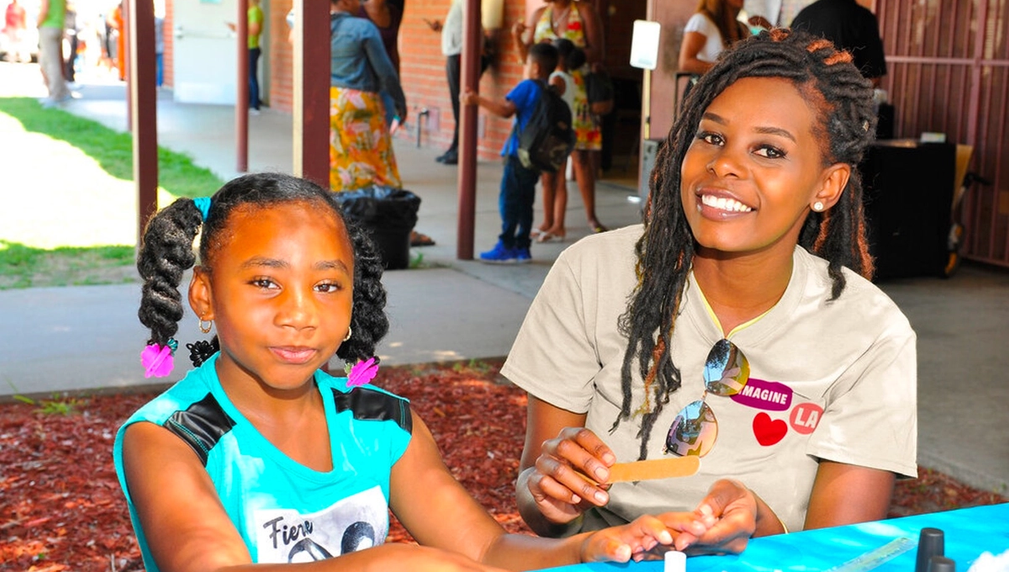Building Equity Together
Imagine LA envisions a future where the generational cycles of poverty and homelessness are a thing of the past. Our Family Partnership Model (FPM) ensures that families emerging from homelessness achieve their goals and thrive. In addition to our holistic case management work, we provide effective Mentorship programming to build the family’s social capital and a sequenced Economic Mobility Program that tackles the key barriers families face to exiting poverty. Together, these supports help families carve a path to long-term wellness.

What is the primary issue area that your application will impact?
Income Inequality
In which areas of Los Angeles will you be directly working?
County of Los Angeles
In what stage of innovation is this project, program, or initiative?
Expand existing project, program, or initiative
What is your understanding of the issue that you are seeking to address?
Family poverty and homelessness are issues of racial, gender, and economic equity. Imagine LA envisions a future where the generational cycles of poverty and homelessness are a thing of the past. Homelessness in L.A. grew by an alarming 46% from 2019 to 2020. There were nearly 13,000 families experiencing homelessness prior to the COVID-19 pandemic, and researchers believe that our current economic crisis may result in up to 600,000 additional people losing their homes over the next three years. However, homelessness is a complex problem that cannot be solved by housing alone. Many interrelated factors, including job and financial instability, domestic violence, and limited support from family and social networks, contribute to an individual family’s housing stability. The system is not set up to support meaningful economic mobility. This is especially true for households led by unpartnered parents, women, and people of color.
Describe the project, program, or initiative this grant will support to address the issue.
Imagine LA works alongside resilient families emerging from homelessness to ensure they have the resources to maintain their housing and plan for the future. Our FPM pairs traditional intensive case management with relationships and resources to help the entire family thrive long-term. We are requesting support for two pillars of our holistic programming – our Economic Mobility Program (EMP) and our Mentorship Program. Imagine LA is best known for its transformative, two-generation Mentorship program. Mentors are caring volunteers from the community who undergo rigorous, equity-forward training and a thoughtful onboarding process to ensure a successful relationship. Each member of the family age 5 and up is hand-matched 1:1 with a mentor based on their personal goals, interests, geography, gender, and background. Mentors provide support and encouragement to mentees as they work to achieve their goals together. The EMP creates whole-family wellness by supporting heads of household to surmount poverty, build wealth, and to thrive long-term. The program provides opportunities that lead to living-wage careers, paired with reliable childcare and Financial Fitness services. Later this year, participants will also be able to use to Imagine LA’s new Social Benefit Navigator, a first-of-its-kind online tool that equips families and case managers to better navigate the complex system of public benefits and plan for changes to eligibility as a family’s income rises.
Describe how Los Angeles County will be different if your work is successful.
Our work has the potential to significantly disrupt generational poverty and systemic inequities across LA County and beyond. We pair our effective EMP and Mentorship programs with innovative tools and social service case management to increase transparency and equip families with the knowledge they need to carve a path to long term wellbeing. We recently published research with USC’s Sol Price School of Public Policy that uncovered how “benefits cliffs” – instances when a slight increase in earned income, even a few dollars, triggers a disproportionate loss in social benefits such as food assistance, housing vouchers, and childcare subsidies. This research highlighted the need for greater transparency and access to social benefits. Our goal in developing the Social Benefit Navigator is to build this lacking transparency and access to social benefits by helping users access existing programs like CalWorks, MediCal, CalFresh, WIC, and additional benefit programs and tax credits.
What evidence do you have that this project, program, or initiative is or will be successful, and how will you define and measure success?
FPM: 95% of families maintain housing 100% of children enrolled in school 95% of children have necessary resources, support, and advocacy for academic success 75% of youth engaged in extracurricular activities 50% of youth (16-25) employed or postsecondary education 70% of adults received wellness exam (past year) 90% of children received wellness exam (past year) 95% of family members with mental health need receiving services 65% of families matched with mentors 90% report that Imagine LA is attentive and responsive 90% report that Imagine LA helps them to build self-efficacy 90% report feeling empowered to face & resolve challenges EMP: 75% of families: one able-bodied adult employed, in school, workforce development program 70% of families in Living-Wage Career Pathways increase earned income 70% of heads of household express interest in Living-Wage Career Pathways 80% of families participate in Financial Fitness 90% of families file their taxes and receive credits if applicable
Approximately how many people will be impacted by this project, program, or initiative?
Direct Impact: 450
Indirect Impact: 850